Trump’s Immigration Agenda: Pros and Cons
Donald Trump’s immigration policies have been a focal point of his political agenda, both during his presidential campaign and throughout his administration. His approach has sparked significant debate and division among the American public regarding immigration reform. While some view his policies as necessary for national security and economic interests, others criticize them for being inhumane, draconian, and discriminatory.
On the positive side, Trump’s immigration plans aimed at enforcing immigration laws more strictly than previous administrations. Supporters argue that his policies were effective in reducing illegal immigration, citing lower apprehension rates at the southern border during specific periods of his presidency. Additionally, Trump emphasized the need for a merit-based immigration system, which many argue would prioritize high-skilled workers and reduce the influx of unskilled labor that could potentially strain public resources.
However, criticism of Trump’s immigration policies cannot be overlooked. Many argue that his approach fostered a climate of fear, leading to the separation of families at the border and detention of asylum seekers in often overcrowded facilities. These measures were labeled as inhumane and counterproductive, with detractors stating that such policies undermine the American ideals of compassion and refuge. Additionally, the travel ban targeting predominantly Muslim countries was seen by many as discriminatory and contrary to America’s founding principles of religious freedom.
The economic implications of Trump’s immigration plans are also a contentious issue. Proponents claim that by prioritizing merit-based immigration, the U.S. would enhance its economy through the influx of skilled labor. They argue that high-skilled immigrants contribute to innovation, entrepreneurship, and job creation. Conversely, critics warn that limiting immigration, particularly low-skilled labor, could adversely affect industries reliant on such workers, such as agriculture and hospitality, leading to labor shortages and increased costs.
Moreover, Trump’s immigration policies highlighted significant divisions within the Republican Party. While some party members supported stricter immigration enforcement, others expressed concern about the potential long-term political ramifications of alienating immigrant communities and moderates. This division became evident in several congressional votes and in the various strategies employed by differing factions within the party regarding immigration legislation.
Ultimately, Trump’s immigration plans have left a profound and lasting impact on the national discourse surrounding immigration in the United States. The polarized opinions reflect the complexity of immigration as a political issue, where the balance between national security, economic benefits, and humanitarian responsibilities continues to challenge lawmakers and society. Future administrations will need to navigate this contentious landscape as they seek to develop cohesive immigration policies that address both the hopes and fears surrounding this critical issue.
Share this content:












Post Comment